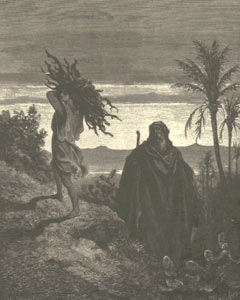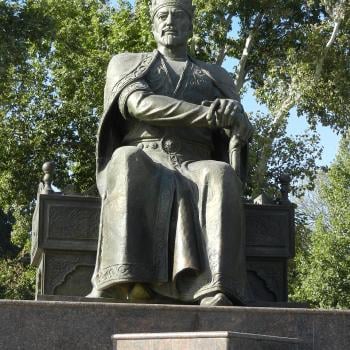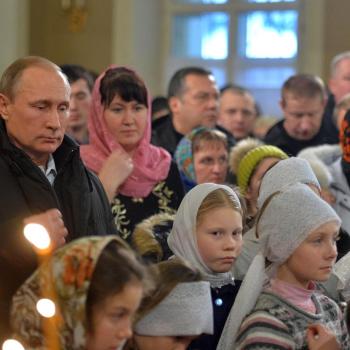Avraham’s and Avimelech’s servants were having a dispute over a well and Avimelech decided his servants were in the wrong, but to ensure that there would never be a dispute again, Avraham “paid” Avimelech in seven lambs. From that point on the area is known as Beer Sheva (you can still visit it today), which means the Well of Seven. And now, as we pull into the end of our parsha, we hit one of the most famous moments in biblical history. In Hebrew it is called the Akeida, the Binding of Isaac -- chapter 22.
So some time has passed and G-d sends Abe a tweet or a text message and Abe’s immediate response is “Here I am,” not dodging the call. G-d tells Avraham to take his son (which one?), your only one (well, I have one with each woman . . .), whom you love (ahhh! The son of my beloved, Isaac), and take him up to the mountains for a burnt offering. Avraham doesn’t respond, but the next day he wakes up, packs a bag, gathers some wood, grabs two servants and his son, and heads out. They reach the location G-d designated and Avraham tells the servants to stay with the donkeys while he goes up the mountain with his son and this big knife and some wood.
About halfway up the mountain, Isaac starts to get curious. We have the wood, the knife, and the fire, but where is the offering? “G-d will provide, son.” They get to the top and start to prepare the altar and then Avraham ties up his beloved son and starts the process to slaughter him. But an angel calls out to him twice, “Avraham, Avraham” (nothing in the Torah is an accident, this is an expression of affection), and tells him not to sacrifice his son. Rather, G-d knows he wouldn’t withhold the thing he loves most in this world from G-d and so right in front of him there is a ram caught in the thicket by his horns. Avraham goes about sacrificing the ram and not his son. Because of this act of faith and trust, G-d will multiple Avraham’s descendants and be blessed. The parsha ends with a bit of genealogy until we reach our next big character, Rivka (Rebecca).

My father has a theory about the Akeida. When you invite someone out to dinner, you aren’t intending to eat this person, correct? You are inviting them to come with you. Perhaps Avraham misinterpreted G-d’s request; perhaps G-d just wanted Abe to familiarize Yitzhak with the process. This, however, isn’t a popular opinion within more orthodox circles. The Rosh Yeshiva of the Mayanot Women’s Seminary gave over this -- “Avraham’s final test is to go against his nature. He was about love for G-d, his family, and man. The true test for any human being is when the right thing goes against our normal pattern. Could we really get out of our box and go beyond ourselves to do the right thing. Or do we always find the right thing that is coherent with our comfort zone.” -- Rabbi Meir Levinger
Avraham Avineu (Abraham our father) is recognized for his intense Chesed, loving-kindness. He is characterized by this trait. He did incredible outreach and spread love all over the place. Not only that, but this child was so desperately wanted and loved. How could G-d ask such a thing? Because G-d knew it would go completely against his nature and the only way to reveal a person’s true self is to jump outside the box.
Please enjoy this video from our partner’s G-dcast. I will say however that this is only one possible portrayal of the relationship between Sarah and Hagar. More common is the portrayal of Hagar as a controlling woman who thinks herself higher than her mistress and treats Sarah horribly.
Parshat Vayeira from G-dcast.com
More Torah cartoons at www.g-dcast.com





